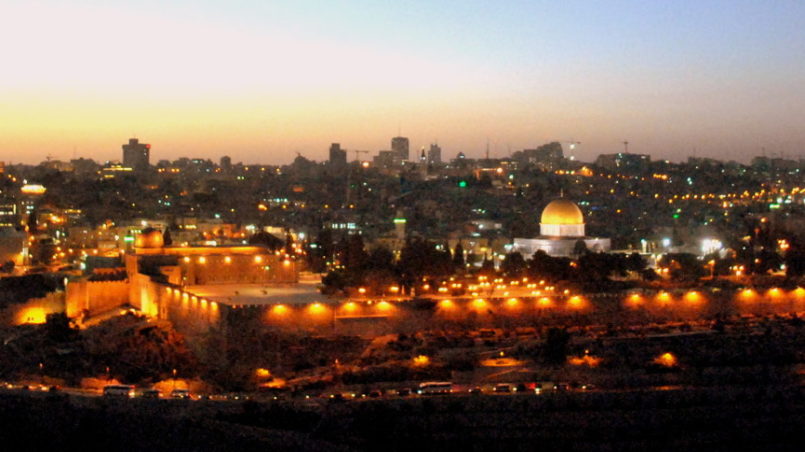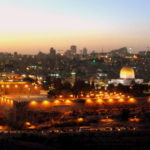The Reality of An Open City: Jerusalem

When I was packing to fly to Palestine, I was somehow aware that the trip would be an amalgam of joyful moments and heart-wrenching experiences. I knew I would be bringing back with me some special moments and feelings from Palestine. Feelings that would establish a special connect with the Palestinians. Some feelings, so special that they would always bring tears in my eyes. I knew those moments and feelings would leave a mark on my soul forever.
And so I was somewhat apprehensive. Not because I was going to the most conflict-ridden country on earth, but because their pain and suffering might give me a very guilty conscience and fill my heart with shame.
Reading and seeing the violations of human rights, the oppression, the humiliation, the unending woes and sufferings in the media do evoke feelings of sympathy and maybe also empathy for the oppressed. One might feel one should do something in whatever capacity one can to help those who are suffering. However, such information from the media and books does not prick one’s conscience. But, when we encounter those moments of oppression and humiliation in real; when we see the suffering first hand; when we get to live those experiences of pain – we can no longer close our eyes and think we are not responsible and that’s not our problem.
I was most excited about visiting Jerusalem. The land of antiquity and the land venerated by Jews, Christians and Muslims alike. I had read a lot about its historical importance and its glory. However, I was also completely aware of the political turmoil that Jerusalem is embroiled in. That both Israelis and Palestinians claim the city as their capital. I was also fully aware of the fact that Palestinians are not allowed to travel to Jerusalem without a permit from the Israeli regime. And such permits are rarely given and almost always denied. I had heard that, although Jerusalem has been declared an international city, its indigenous people are barred from entering the city without a permit from Israeli authorities.
I woke up early in the morning and got ready to visit Jerusalem. We were asked to take scarves so that we could cover our heads while visiting the Al-Aqsa Mosque. I borrowed a scarf from a Palestinian friend. I looked at her and could see that her eyes were filled with tears. She smiled at me and said, “You are lucky that you will visit the holy land”.
I came out of my room to go to the hall where breakfast is served. I soon realized that the Palestinian girls were giving their head scarves to the other girls (participants of the Youth Camp) who were going to Jerusalem. In fact, on that day, many non-Palestinian girls were wearing the hijab, which they had borrowed from the Palestinian girls.
For the non-Palestinians as well as non-Muslim girls, wearing a hijab while going to Jerusalem was a gesture of solidarity with the Palestinians who are denied entry to their own capital city. However, letting the non-Palestinian girls wear their hijabs and visit Jerusalem also carried some significant meaning for the Palestinian girls. The gesture of solidarity was easily discernible. But it took me some time to completely understand and appreciate the motive of the Palestinian women in lending their hijabs.
The Palestinian participants weren’t going to Jerusalem with us. They were glumly standing with us near the lobby, where we usually gather before boarding the buses. That day, they were in their pyjamas and t-shirts, while others who were going to Jerusalem were properly dressed. It felt somewhat different to see them dressed like this. I really felt awkward. Leaving them back there in the camp made us feel bad. It wasn’t right that the Palestinians could not visit their own capital. But there was nothing that we could do.
They have grown up listening to stories of the grandeur and sacredness of the mosque but could never pray there. They were not sure when they would get a chance to visit their Holy Land, which is situated just a few kilometers away from Jericho. And they knew that their chances are bleak.
So they have to wait until they get old to visit a mosque located just a few kilometers away from their cities. Yes, this is the reality of Jerusalem, which is claimed to be an open city. But closed for its indigenous people.
Since they cannot visit Jerusalem and thus the Al-Aqsa Mosque in the near future because of Israeli restrictions, they chose to give away their headscarves to those who would be visiting the Al-Aqsa Mosque. In that way, at least some belonging of theirs could enter the holy mosque. In that ways they hoped and expected that they would feel the spirituality emanating from the mosque. Though that would never satisfy their desire to set foot on the holy land of their ancestors, for the time being it might help to assuage their yearnings.
Finally the buses came. Some of us boarded the bus and took our seats. I got a seat next to a diasporic Palestinian from Canada. I realized that she was in tears. As more and more people started to board the buses, the Palestinians, who had earlier looked merely downhearted, started to weep and snivel. They burst into tears. In that moment we felt the dehumanizing policies of Israeli politics the most. And the mood inside the bus became so gloomy that all my happiness and excitement regarding the visit to Jerusalem started to disappear into thin air.
It was really strange.
That which caused me so much pain was not just limited to issues of restrictions on visiting Jerusalem or the Al-Aqsa Mosque. It was not just about permits and concomitant denials. Permits and restrictions have become a part of our everyday life in this world which is bound by territorial boundaries and nationalities, rather than humanity and fraternity. Though one cannot deny the severity of the Palestinian situation.
However, it’s the caging of “a people” and shackling them in every possible way, which caused me pain. It is about robbing them of their natural right to live a dignified life. The denial of political independence is accompanied by a lack of freedom in almost every aspect of Palestinian lives.
I tried to imagine myself as a Palestinian that day. I could, and to be honest I seriously felt so caged. I still hate the feeling I experienced on that particular day. And that feeling continues to prick my conscience.
Credits
| Image | Title | Author | License |
|---|---|---|---|
 |
The Reality of An Open City: Jerusalem | Sumana SIngha | CC BY-SA 4.0 |
